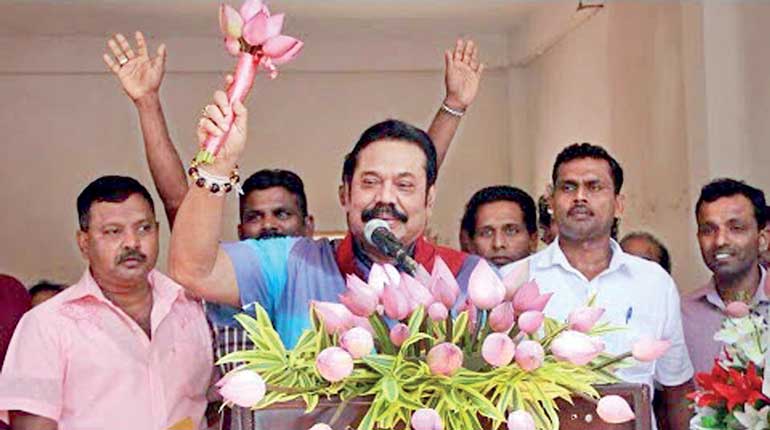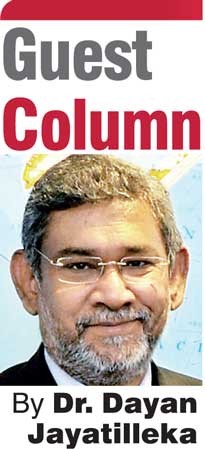Friday Mar 06, 2026
Friday Mar 06, 2026
Monday, 12 February 2018 00:00 - - {{hitsCtrl.values.hits}}

It was the well-established, UNP and West-friendly website ECONOMYNEXT that broke the story using the ‘L’ Word—Landslide.
“Former President Mahinda Rajapaksa’s proxy was set for an unexpected landslide victory in Saturday’s local council elections…Unofficial results showed that the Sri Lanka Podujana Peramuna (SLPP) was leading in almost all the districts outside the north and the east and was on its way to secure an unassailable 51 percent of the total votes polled. Prime Minister Ranil Wickremesinghe’s United National Party (UNP) was being pushed to a humiliating second place,” an article on the website stated (‘Rajapaksa proxy heads for landslide in Sri Lanka vote’ 10 February).
“Landslide” certainly, “unexpected landslide”—er, not entirely. I was probably one of the very few (to put it exceedingly charitably) in the mainstream media who called it right, quite unambiguously, and on the record: “…or whether (as I think) the Pohottuwa will wind up quite simply, the largest single party, displacing the UNP from that historical role and status.” (‘Feb 10th and the Electoral Gamble that Failed’, The Island, Wednesday, 7 February 2018).
The fact that I predicted this result proves that the result was predictable—all it needed was not to be blinded by the veils of Maya. Not only didn’t MR’s Pohottuwa come a “close second” to the UNP, the UNP didn’t come a “close second” to MR’s Pohottuwa!
My personal favorite piece of pre-election punditry was Sunanda Deshapriya’s firm prediction of MR’s crushing defeat, in a signed column in the Ravaya, saying that “Mahinda’s Pohottuwa won’t succeed in getting even 51% of the Sinhala majority”. 
Political columnist C.A. Chandraprema and I cannot be faulted if we were the only ones to take serious note, repeatedly and in print (in my case, also on my fortnightly TV show on Sirasa), of the results of the Multi-Purpose Cooperative Society (MPCS) elections of last year in which the pro-Mahinda camp swept the board against all comers and all combinations of all comers. They were the precursor of what has now arrived.
Thus my initial response is not to write at length on the why and wherefore of the result, because my political writings in these forums have consistently given the reasons why this should and would happen.
What I am more concerned about are the larger strategic picture and what I had defined in the title of my first book (Vikas, New Delhi 1995) as Sri Lanka’s “Protracted Crisis”.
Sri Lankan politics is determined by the dynamics on two axes: the horizontal and the vertical. The horizontal axis pertains to the contestation for political power at the center between parties or blocs. This is the dimension of South-South competition. The vertical axis of Sri Lankan politics is the North-South one, dealing with the dynamics of the Northeastern and the South, as well as what I termed in my Deshamanya Nandadasa Kodagoda Lecture of 2013 as the Greater North or the Far North, i.e. the world. This horizontal dimension is that of Center-Periphery politics in which Colombo is the center and Jaffna the periphery , but this gets inverted the further away we move, and Colombo is the periphery while the developed world’s capitals are the center.
Response to Brigadier Fernando
On the day of the election, the news broke that the TNA had joined 10 Tamil diaspora organisations to demand that Brigadier Priyanka Fernando be declared persona non grata.
What does this mean and portend? Let’s start with the 10 Tamil Diaspora organisations which cover the entire politico-ideological spectrum in the UK: Tamil Conservatives, Tamils for Labour and Tamil Lib-Dems. They’ve written a lengthy petition to the British authorities in support of their demand.
These Tamil groups in the UK have petitioned Home Secretary Amber Rudd and Secretary of State for Foreign and Commonwealth Affairs, Boris Johnson, requesting that the British government “declare the Sri Lankan Military Attaché Brigadier Priyanka Fernando a Persona non Grata for committing a serious offence under British law, abusing diplomatic immunity in the UK and committing war crimes and crimes against humanity in Sri Lanka and therefore, to curtail his leave to remain in the UK.”
The Tamil Diaspora groups that have made this request are the British Tamil Conservatives (BTC), British Tamils Forum (BTF), Global Tamil Forum (GTF), International Centre for the Prevention and Prosecution of Genocide (ICPPG), Tamils Coordinating Committee (TCC-UK), Tamils for Labour, Tamil Friends of the Liberal Democrats, Tamil Information Centre (TIC), Tamil National Alliance – UK (TNA-UK), Transnational Government of Tamil Eelam (TGTE), Tamil Solidarity (TS), Tamil Youth Organization (TYO) and World Tamils Historical Society (WTHS).
Very significantly the petition is not merely against Brigadier Fernando but is a 14-page long diatribe against the waging of the war and the Sri Lankan State and Government. The critique of Brigadier Fernando does not pertain merely to his hand gesture but to his role as a combat officer in our war of liberation from terrorism.
Not once in the petition do the signatories condemn or even refer to the incontrovertible fact that the demonstration by ‘Tamil Solidarity’ was replete with Tiger banners, sundry regalia and pro-terrorist slogans (‘Our Leader-Prabhakaran’).
The fact that they have not tried to put any distance between themselves and the LTTE driven nature of the mobilisation shows they have no problem whatsoever with that Tiger/pro-Prabhakaran character. This in turn logically means that these 10 Tamil Diaspora organisations are pro-separatist, pro-terrorist and pro-totalitarian. This is not democratic dissent.
It is also noteworthy that there has not been a Tamil political voice which is critical of both the Brigadier and the Tiger demonstrators. This means that the Tamil diaspora political space is either pro-separatist terrorist or lacks a strong and bold enough alternative within it; an alternative that could be anti-government and even anti-state, but is anti-LTTE.
What is striking is that this pro-Tiger militancy was demonstrated on Sri Lanka’s 70th Independence Day, with no Tamil cautionary note against it, precisely while there is a liberal Sri Lankan Government in place, not a militantly majoritarian nationalist one.
If this is how the Tamil Diaspora treats the liberal reformist Sirisena Government, we can clearly understand the true nature of that Diaspora and the underlying community.
If push comes to shove, the Tamil Diaspora is pro-Tiger or too scared to be otherwise, then it cannot be a legitimate partner for dialogue on the part of Sri Lankan democrats, progressives, liberals or the democratic Sri Lankan state.
But these are the UNP’s partners and allies! What is most striking and strikingly dangerous is that these organisations are partners of the UNP in government. These are organisations that were unbanned by Mangala Samaraweera as Foreign Minister.
These are organisations which accompanied Samaraweera to Singapore before the election of January 2015. These are organisations which Samaraweera met officially in London when he was Foreign Minister. These are organisations which were received over the past three dismal years at the offices of the Sri Lankan Government and State in Colombo, including the Foreign Ministry.
Just several weeks ago, the GTF/BTF posted photographs and a statement announcing the discussion at the Sri Lankan Foreign Ministry in Colombo, between the GTF-BTF’s Fr. Emmanuel and the Secretary to the Ministry of Foreign Affairs and his closest comrade-in-arms.
Now we come to the Tamil National Alliance (TNA) whose logo accompanies the statement of the 10 Tamil Diaspora organisations. The TNA is supposed to be the ‘moderate’ Tamil nationalist party. If this is Tamil moderation, one can well imagine what Tamil radicalism is like.
Whether or not the TNA logo at the bottom of the letter refers only to its UK branch (it does not say so), the results of the election and the TNA’s political behaviour including the boycott by Mr. Sampanthan of our 70th Independence celebrations, show a yawning and growing gap which is perhaps unbridgeable. The TNA is the Yahapalana Government’s chosen Opposition. The Government chose the TNA with its 16 seats over Mahinda Rajapaksa and Dinesh Gunawardena’s Joint Opposition with its 50 plus seats, as the official Parliamentary Opposition.
New constitution
The TNA chose to reciprocate this unwarranted and illegitimate generosity by pushing the Government and the country for a new constitution instead of greater autonomy within the existing one, adding insult to injury by pushing for Geneva–driven accountability with an international aspect or component. The results of the Local Government election show the complete rejection of the Government’s West-backed or designed political experiment.
The Government’s pro-Western elitist minoritarianism has been decisively rejected at this election. On the one hand, the election result is a massive populist protest vote; a majoritarian backlash against liberal elitist cosmopolitanism. On the other hand, the mood of the largest minority, the Tamils living in and outside Sri Lanka, has become less accommodating and pragmatic, more unrealistic, militant and obdurate.
The nonsensical attempt at a new Constitution, killing off the unitary state, is itself now dead in the water. The Ranil-Mangala-Chandrika-Sumanthiran project, backed by the West, has been decisively defeated. The West’s allies have been crushed, leaving it with its traditional clients, the Tamils.
The Tamil nationalists’ allies, the UNP and Chandrika’s SLFP have lost. Even more so, the apt responses of UNP ‘Young Turks’ Navin Dissanayake and Ruwan Wijewardene to the issue of Brigadier Fernando show that not only have the Tamil nationalists’ Southern allies lost but that the Tamil nationalists have lost the support of their Southern allies.
Similarly, the Southern liberals are no longer in any position to negotiate with the Tamils. They need to first renegotiate their political viability with the Sinhalese, including their own voters.
The 70th Independence Day behaviour and the London affair show that Tamil sentiment is so far out on a limb that no deal seems possible with any Southern partner, be it the incoming SLPP, the struggling Government or the JVP. Having damaged their UNP-SLFP partners by putting them out of reach of their own Sinhala voters, and with a rather more nationalist-populist SLPP on the march, the Tamil nationalists no longer have any Southern partner.
There are no Southern takers for the new Constitution, still less a new Constitution and the implementation of the Geneva resolution on accountability. There is no deal on the table, except perhaps for the one that was always there: a modest rectification and upgrade of really existing devolution. That too may be off the table at the moment and for the moment, i.e. not because of substance but timing. The time for a deal even on adjusting existing autonomy arrangements may have passed.
Reason dictates that the Tamil mainstream regards as its Southern partner or prospective partner, that political entity and personality most likely to form the next administration, in 2019-2020. That would mean entering serious negotiations on a basis that won’t be laughed out of court by the incoming national political formation and resisted by its vote base. The problem is that logic and reason have vacated the Tamil nationalist political space quite some time ago.
The vast majority of the country’s citizens, living in the bulk of the island and decisive in the matter of state power at the center, have gone one way; Tamil nationalist politics the other. One movement is clockwise, the other, counter-clockwise. The election is over, but Sri Lanka’s Long Crisis continues.